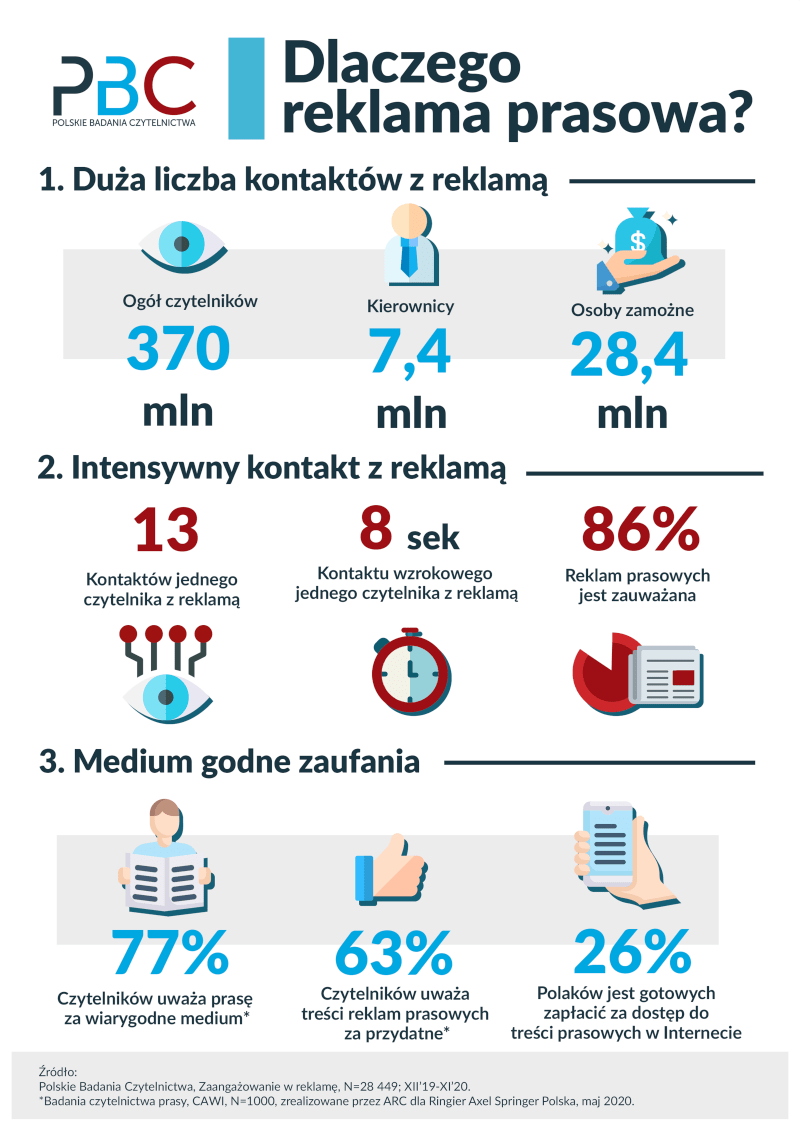- The total number of ad impressions is approximately 370 million,
- affluent individuals account for 28.4 million impressions,
- individuals in managerial positions generate 7.4 million impressions.
 Source: PBC
Source: PBCAnother key metric is ad engagement. According to PBC, print ads are highly engaging and difficult to overlook.
- 86% of readers notice print advertisements,
- the average visual contact with an ad lasts 8 seconds,
- each reader has an average of 13 ad impressions.
Trust is another factor highlighted by the study, with print advertising scoring high in this regard.
- 77% of readers consider the press a reliable medium,
- 63% find print ad content useful,
- 26% are willing to pay for access to online press content.
PBC`s reports are based on eyetracking studies covering both daily newspapers and magazines. Detailed information on the effectiveness of advertising in the most popular press titles was published in early 2021.
COMMERCIAL BREAK
New articles in section Media industry
Tags, hashtags and links in video descriptions. Youtube SEO after Gemini AI update [ANALYSIS]
BARD
Once, positioning a video on Youtube was simple. It was enough to stuff the description with keywords and wait for results. Those days are not coming back. In 2026, the algorithm is no longer a simple search engine that connects dots. It is the powerful Gemini AI artificial intelligence that understands your video better than you do.
Freelancers 2025 in media and advertising. Useme report
Krzysztof Fiedorek
The modern media and communication market presents entirely new challenges for independent creators. Traditional services are giving way to more complex forms of messaging. The most popular industries in which Polish freelancers operate focus on companies' online presence and visual content.
Video content in Poland. What and how we watch
Paweł Sobczak
Video content is watched remotely, but streaming services are mainly enjoyed in the comfort of home. This is how the consumption of audiovisual content by Poles in 2025 can be summarized. This is the result of an analysis of a study conducted by SW Research and data from the company MEGOGO.
See articles on a similar topic:
Safari Surpasses Opera. A New Shift in the Browser Market in Poland
Krzysztof Fiedorek
In the summer of 2024, a historic event occurred in Poland's browser market. In July and August, Safari surpassed Opera on all devices for the first time. Data from the StatCounter report indicates that Apple's browser maintains a steady market share while Opera is gradually but noticeably losing ground.
Trends in Media and Entertainment. DataArt Predictions for 2019
KF
Increasing consumption of content on mobile devices, growing demand for on-demand services, and the rapid development of user-generated content are the trends expected to dominate the tech sector in 2019, according to DataArt, a global technology consulting firm.
Influencers Earn Too Much. No Fluff Jobs Report
KrzysztoF
According to nearly 70% of Poles, influencers earn too much, and 54% feel the least affection for them out of all professions. Only politicians receive equally low regard among respondents surveyed by No Fluff Jobs. On the other hand, nurses and… farmers are considered underpaid.
Read digital newspapers and magazines in PDF, EPUB and MOBI [LINK]
AUTOPROMOCJA Reporterzy.info
The most popular daily, weekly, biweekly and monthly magazines in electronic PDF, EPUB and MOBI formats. For reading on a computer, smartphone and e-reader. The latest issues, archive issues and subscriptions are just a few clicks away. Visit our Reporterzy.info Store





























